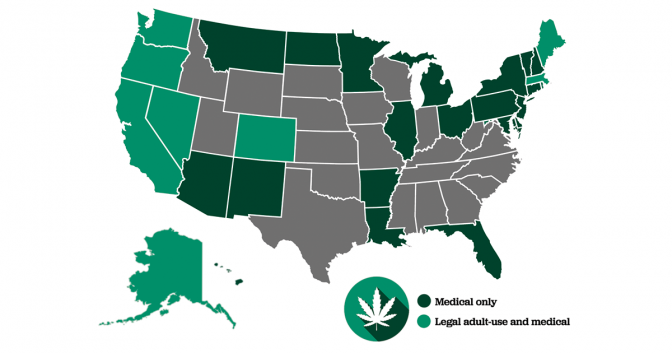2016: The Year Legalization Went Legit

Marijuana reformers made history at the ballot box on Election Day, following a banner year in state houses across the nation. In 2016, lawmakers in 24 states approved more than 30 pieces of marijuana policy reform legislation, and on Nov. 8, voters in eight states decided in favor of marijuana law changes. Here are the highlights.
Adult-Use Legalization
California:
Fifty-six percent of California voters approved Prop 64, the Adult Use of Marijuana Act. The statewide ballot measure permits adults to grow up to six plants and possess up to one ounce of flowers and up to eight grams of concentrates—effective immediately—and legalizes licensed commercial cannabis production and retail sales. It reduces numerous marijuana-related activities from felonies to misdemeanors, while also providing for resentencing consideration for those previously convicted of marijuana offenses. Adult-use sales are expected to begin on Jan. 1, 2018.
Maine:
No Election Day race was closer than the battle over Question 1, the Maine Legalization Act. Election officials declared the measure victorious by just 2,620 votes. Mainers will be allowed to possess up to two and one-half ounces and cultivate up to six flowering plants (and 12 immature plants) on Jan. 8, 2017. Regulations for retail and cultivation businesses are anticipated to be in place by Aug. 8, 2017.
Massachusetts:
Fifty-four percent of Massachusetts voters backed Question 4, the Regulation and Taxation of Marijuana Act, which, despite its name, imposes the lowest excise tax (3.75%) on retail marijuana sales in the nation. The law, which takes effect Dec. 15, permits adults to grow up to six plants and possess up to 10 ounces of flowers and up to five grams of concentrates. Regulators are scheduled to begin accepting applications for commercial cultivation and retail businesses on Oct. 1, 2017. However, stores will not open until the second half of 2018.
Nevada:
Fifty-five percent of Silver State voters endorsed Question 2, the Initiative to Regulate and Tax Marijuana. The measure authorizes adults to legally grow up to six plants if they live more than 25 miles from the nearest cannabis retailer, and to possess up to one ounce of flowers and up to 3.5 grams of concentrates procured from state-licensed retailers. The new law takes effect on Jan. 1, 2017. Regulations governing commercial marijuana activities must be in place by Jan. 1, 2018.
Medical Marijuana Legalization
Arkansas:
Former DEA head Asa Hutchinson is not amused. Fifty-three percent of Arkansas voters said no to Governor Hutchinson’s efforts to thwart Issue 6, the Arkansas Medical Marijuana Amendment. The new law, which took effect Nov. 9, amends the state constitution. It permits qualified patients who possess a physician’s recommendation to legally obtain and possess medical cannabis provided by state-licensed dispensaries; home cultivation is not permitted. State regulators will begin accepting applications from dispensary providers by June 1, 2017.
Connecticut:
Lawmakers approved legislation in May that expanded the state’s medical cannabis program. House Bill 5450, which took effect in October, provides access for patients under 18 years of age, as well as patients with seizure disorders, spinal cord injuries, cystic fibrosis and cerebral palsy. The new law also paves the way for hospitals to legally administer cannabis to patients.
Florida:
The second time around proved to be the charm in the Sunshine State. After voters narrowly rejected medicinal cannabis in 2014, 71% of Floridians supported Amendment 2, the Use of Marijuana for Debilitating Conditions Initiative, in 2016, which makes access a constitutional right under state law for those with a qualifying illness and a doctor’s recommendation. Under the measure, patients must obtain a state-issued identification card in order to purchase products from state-licensed dispensaries; home growing is not allowed. Health officials are required to begin issuing cards and dispensary licenses on Aug. 8, 2017.
Louisiana:
In May, Governor Jon Bel Edwards signed Senate Bill 272, which resurrected the state’s dormant medical cannabis program. Under the new legislation, doctors are now permitted to recommend (rather than “prescribe”) cannabis to qualifying patients. Under separate legislation passed in 2015, regulators are required to license 10 pharmacies in the state to provide non-smokeable cannabis products to registered patients. Health officials have yet to approve any in-state manufacturers.
Michigan:
After years of legal uncertainty, medical marijuana dispensaries have finally been recognized under new state laws signed by Governor Rick Snyder in September. The bills license and regulate medicinal cannabis providers, and also define cannabis extracts and edible products as non-contraband.
Montana:
Fifty-seven percent of Treasure State voters bucked lawmakers by approving I-182, the Montana Medical Marijuana Initiative. The new law restores many aspects of the state’s 12-year-old medical marijuana program, which was gutted by the state legislature in 2011. It expands the list of qualifying conditions, establishes licensing procedures for dispensaries and testing facilities, authorizes caregivers to serve multiple patients and allows providers to hire employees to cultivate, dispense and transport medical marijuana. The law takes effect on June 30, 2017.
Ohio:
Governor John Kasich made it clear during the presidential campaign that he’s no fan of medical marijuana. Nonetheless, in June, he signed House 523, which establishes regulations for the state-licensed production and dispensing of cannabis and cannabis-infused products to qualifying patients. Although the program is not anticipated to be fully operational until early 2018, the law provides some legal protections for qualifying patients who acquire cannabis from alternative sources.
North Dakota:
Sixty-four percent of voters passed Measure 5, the North Dakota Medical Marijuana Legalization Initiative. The law, which will take effect 90 days after election officials certify the results, permits qualified patients to obtain medical cannabis from state-licensed dispensaries. Patients or caregivers who live 40 miles or more from the nearest dispensary will be permitted to cultivate up to eight plants at home.
Pennsylvania:
After years of debate, Keystone State lawmakers gave final approval in April to Senate Bill 3, which regulates the cultivation and distribution of medical cannabis and related products. Under the legislation, state regulators may license up to 25 cultivators and processors, and up to 150 dispensaries where qualified patients can purchase non-smokeable products. The program is expected to be operational by early 2018.
Penalty Reduction
Kansas:
While marijuana possession remains illegal in Kansas, penalties for violating the law became a bit less punitive when Governor Sam Brownback signed sentencing reform legislation (House Bill 2462) in May. The law, which took effect immediately, reduces criminal first-time marijuana possession offenses from a Class A misdemeanor to a Class B misdemeanor.
Illinois:
For the second straight year, Prairie State lawmakers sent marijuana decriminalization legislation to the desk of Governor Bruce Rauner, who signed it in July. The new law changes minor marijuana possession offenses (up to 10 grams) from a criminal misdemeanor to a civil fine of no more than $200.
Ohio:
The Buckeye State’s longstanding “Smoke a joint, lose your license” law is no more. In May, legislators voted overwhelmingly to repeal the law, which penalized minor drug offenders with a mandatory driver’s license suspension. Senate Bill 204 took effect in September.
Municipal Reforms
On Nov. 8, Denver voters approved I-300 by a narrow margin. The Neighborhood Approved Cannabis Consumption Pilot Program allows adults to consume marijuana in participating bars and lounges.
In Florida, Orlando and Tampa enacted ordinances that permit police to cite and fine minor marijuana offenders instead of making arrests. In Tennessee, Memphis and Nashville passed similar ordinances; however, state Attorney General Herbert Slattery has contended that the measures are preempted by state law, placing them in legal limbo.
In Michigan, East Lansing repealed all criminal and civil penalties associated with the possession of up to one ounce of cannabis. Finally, in Ohio, four cities—Newark, Bellaire, Logan and Roseville—approved local ballot measures that eliminated penalties for offenses involving 200 grams or less of marijuana.
If you enjoyed this Freedom Leaf article, subscribe to the magazine today!

